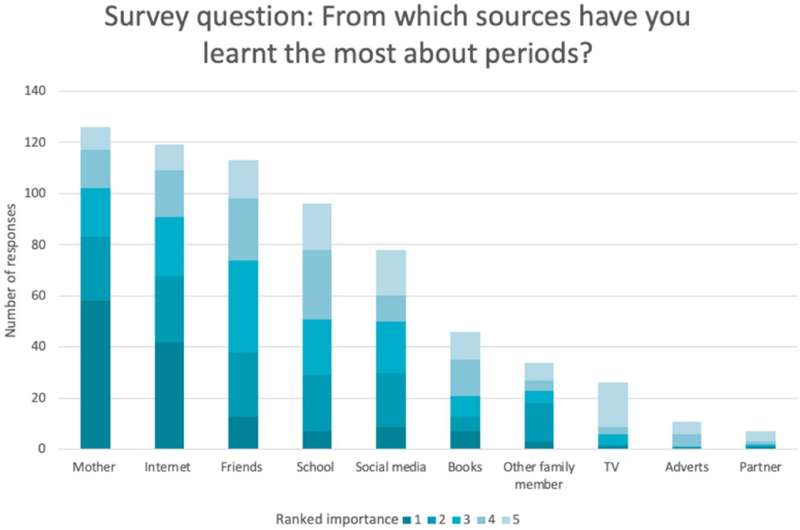
A brand new examine reveals inadequacies in menstrual well being training provision in English faculties. Findings spotlight a scarcity of sensible info being supplied, pupils being taught too late, and attitudes that perpetuate stigma. The analysis is printed in Girls’s Reproductive Well being.
Of younger ladies surveyed within the examine, which sought to grasp what and the way menstrual well being training info was delivered in English faculties, 10% didn’t obtain or bear in mind receiving any menstrual well being training. Of these pupils who did, as much as 1 in 5 didn’t obtain training till after that they had began their interval.
The publication of the analysis, led by the College of Bristol and Anglia Ruskin College, coincides with the present Relationships, Intercourse and Well being Training (RSHE) draft steering session, which is proposing new age limits for a number of RSHE matters, together with banning kids from being taught in regards to the menstrual cycle earlier than 12 months 4.
On this examine, researchers surveyed 140 younger ladies aged 18–24, who had attended both a personal or state-funded main and secondary faculty, on their menstrual well being training. Of those, 99.3% had skilled menstruation. The typical age of the survey respondents was 21.9 years.
Individuals have been requested to participate in on-line surveys and in-depth interviews to share their experiences, together with what and the way info was offered at college and replicate on their ideas and emotions about their training taught beneath the earlier Relationships and Intercourse Training (RSE) pointers delivered from 2000.
From the survey outcomes, researchers discovered classes centered on organic content material with a scarcity of sensible info wanted to assist college students handle menstruation and menstrual well being, with almost seven in ten individuals having reportedly acquired no sensible info. Not one of the individuals have been taught about menstrual well being circumstances and solely 3.2% discovered about irregular signs.
Severe long-term impacts have been reported, as a number of individuals delay searching for medical consideration for debilitating signs as a result of they thought their ache was regular, solely to be later identified with circumstances resembling endometriosis.
Total, individuals left faculty missing primary information and feeling ill-equipped with 62.4% score their training as “poor” or “very poor” in getting ready them for managing menstruation. In excessive instances, some have been so unprepared that after they began their intervals, they thought they have been ailing and even dying.
Whereas faculties have been seen as an necessary supply of knowledge, many needed to depend on different sources—significantly the web and social media—which poses its personal dangers, in addition to boundaries for many who lack entry to such assets.
Poppy Taylor, Ph.D. researcher in Inhabitants Well being Sciences on the College of Bristol, and corresponding writer, responding to the proposals of the RSHE draft steering, mentioned, “Given the proof that women are beginning their intervals at ever-younger ages, there are considerations this will likely be too late for an rising variety of folks. Denying younger folks with details about their our bodies dangers important long-term hurt.
“Our analysis offers sturdy proof that the training system has been failing younger women and individuals who menstruate. We have been shocked and dissatisfied, however sadly not shocked, with our findings.”
Globally, menstrual well being is a key difficulty for gender equality. When menstrual wants are unmet, it may possibly create boundaries to training and employment, pose long-term well being dangers and threaten human rights. Proof means that persistent stigma and lack of public understanding about menstruation is stopping such wants from being met within the U.Okay. It’s acceptable that faculties present well timed and complete menstrual well being training.
Poppy Taylor added, “Our findings counsel that for a lot of younger folks, the menstrual well being training they acquired failed to organize them bodily, mentally, or socially for his or her first interval.
“We suggest that menstrual well being training is improved by the supply of earlier, extra inclusive classes with extra sensible content material to make sure all younger folks are outfitted to handle their menstrual well being in a supportive atmosphere.
“To assist the U.Okay. authorities’s goal of eradicating interval stigma and poverty by 2030, universally accessible and complete menstrual well being training should be prioritized.”
The authors acknowledge that the reported experiences within the examine, significantly from older individuals, could not replicate present practices. As a result of small pattern dimension, additional analysis is required to discover the experiences of scholars who’re at the moment within the education system and to grasp whether or not and the way practices have modified.
Extra info:
Poppy Taylor et al, Investigating Younger Girls’s Retrospective Perceptions and Experiences of Menstrual Well being Training in Faculty Settings, England, Girls’s Reproductive Well being (2024). DOI: 10.1080/23293691.2024.2323732
Quotation:
Research exposes gaps in menstrual well being training in English faculties (2024, June 24)
retrieved 24 June 2024
from https://medicalxpress.com/information/2024-06-exposes-gaps-menstrual-health-english.html
This doc is topic to copyright. Aside from any honest dealing for the aim of personal examine or analysis, no
half could also be reproduced with out the written permission. The content material is offered for info functions solely.
